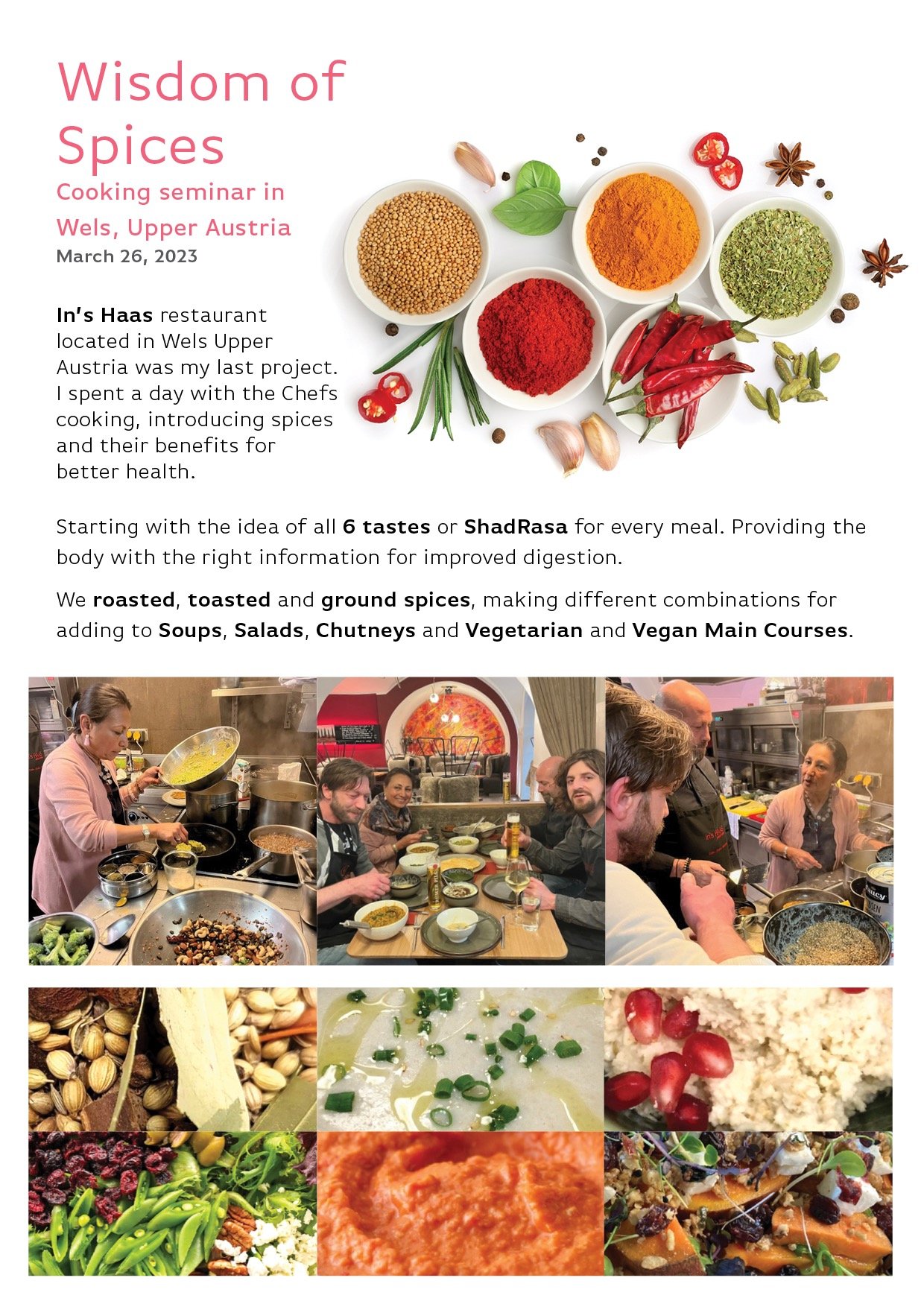Introduction to Ayurvedic Food & Recipes
“Because we cannot scrub our inner body we need to learn a few skills to help cleanse our tissues, organs, and mind.
This is the art of Ayurveda.”
Principles Of An Ayurvedic Meal - Let Thy Food Be Thy Medicine
Ayurveda considers food to be one of the most important pillars of health and views the health of the body as the functioning of a biological fire called AGNI. The role of Agni in digestion is of the utmost importance in Ayurveda since indigestion is thought to be the root cause of many illnesses. A strong Agni is vital for good health.
An Ayurvedic meal includes all 6 tastes for a balanced meal and takes into account proper food combinations, making meals easy to digest. Ayurveda has established that when all six tastes or Rasas are balanced, we lose detrimental cravings. The use of spices and herbs is well cared for and the season is always taken into consideration.
Ayurvedic meals are made with love, eaten fresh and chewed well, in a pleasant, quiet environment. Learn more about the next Ayurvedic Detox Program here.
The 6 Tastes in Ayurvedic Cooking
The 6 tastes in Ayurvedic cooking are sweet, sour, salty, pungent, bitter and astringent. This is accomplished easily by the magic of spices and herbs. Not only can we balance flavors and nutrition for better health for everyone we feed, but the body receives a bio-diverse energetic palate. This energetic palate supplies the body’s cells with instructions specific to one of the taste categories. Learn Ayurvedic cooking with me, visit my Private Cooking Classes section.
In general, the six tastes inform the body with the following cellular information:
Sweet: Grounding, strengthening, nourishing
Sour: Cleansing, purifying
Salty: Balancing, regulating
Bitter: Detoxifying, mineralizing
Astringent: Anti-inflammatory, cooling
Pungent: Warming, stimulating
The Use Of Spices In Ayurveda
Herbs and spices are not just tasty seasonings and great for garnishing; they also carry the blueprints for healing and aid in the balancing of body, mind & soul. The ancients considered spices and herbs as yogavahi (in Sanskrit, “vahi” means carrier and “yog” means that there is union). Simply put, a yogavahi is a substance that brings out the inherent power of whatever it is paired with.
Herbs and spices aid in the rate of absorption, bioavailability and metabolizing of the food that we eat. They have the ability to transform a hard to digest meal into an easily digestible one, and the enhanced flavors of herbs and spices make it possible to reduce the use of sodium, unhealthy fat, and sugar in a meal.
Important Spices & Herbs According To Doshas
Spices and herbs not only add flavor, aroma and visual appeal to food, but they also help increase and stimulate the appetite, thereby maintaining digestive strength. The natural biomolecules in spices and herbs are rich in various antioxidants, minerals and nutrients. The proper use of spices and herbs in cooking food can result in the total nourishment of the body. Join My Next Ayurveda Workshop.
ayurveda Recipes - A Meal with Six Tastes
Tri-Dosha Tea With Cumin, Coriander And Fennel
Ideal for balancing the Doshas, this tea is also used for lactation, as well as a diuretic to stimulate the kidneys and reduce cholesterol. Coriander is an effective diuretic and has anti-bacterial properties that aid in combating allergies. In parts of India, it is traditionally used for its anti-inflammatory properties and in the treatment of ulcers. Cumin is a cooling spice and is known as the “seeds of good digestion”. The oil extracted from the seeds has a stimulatory effect on the immune system and helps in combating infections. Cumin is known to flush toxins out of the body and provide iron for energy, in addition to being a strong antioxidant. Fennel seeds are a cooling spice with a unique combination of nutrients which make it a powerful antioxidant. It is a gentle herb that can stimulate your digestive fire, help cure stomach complaints and is extremely good for digestion.
INSTRUCTIONS: 1tsp each of Cumin, Coriander and Fennel, plus 3 cups of water. Cook the spices in water by bringing to a rolling boil, then lower heat and let simmer for 20 -30 min. Strain & drink.
Cooling Khichadi - Salty & Sweet
Summer is the time to eat lightly and detox the system. Ayurveda recommends KHICHADI (a dish of rice & lentils, derived from the Sanskrit word ‘khicca’ ) as the very core of nutritional healing.
Ingredients:
½ cup Basmati Rice
½ cup Mung Dal
2 cups Zucchini
2 Tbsp Ghee
1 tsp Cumin Seeds
2 Bay leaves
4 Peppercorns
1 tsp grated ginger
½ tsp Turmeric
½ tsp Salt
5 to 6 cups of Water
2 Tbsp Coriander leaves for garnish
Wash the rice and dal thoroughly. Warm the ghee in a medium saucepan. Add cumin seeds, bay leaves and peppercorns until the spices are fragrant. Stir in turmeric, the washed Rice and Dal. Add salt, ginger and then the water. Simmer covered over medium heat until the mixture becomes soft, about 30 minutes. Wash and dice vegetables. Add to the rice and dal, cook for another 15 minutes. Garnish fresh coriander and serve. People with too much Pitta should not use black pepper and add extra coriander. Serve with pickled ginger and sweet lemon pickle and a cup of plain or cucumber yogurt.
Homemade Ghee - Sweet
In Ayurveda Ghee is sometimes referred to as “liquid gold,” and is a nutritious powerhouse. Or "Maha Sneha" a quality that is building and nourishing as love.
Ghee contains more nutrients than ordinary clarified butter since it is processed with low heat—generally under 100 degrees. It is high in omega-3 fatty acids as well as vitamin A,D and K. Butyric acid, a short-chain fatty acid found in ghee, has been associated with decreased levels of inflammation and better digestive health in human and animal studies.
Ingredients - 250 gm. Organic Butter
Directions
Ideally we could use a good butter warmer but a small heavy bottomed pot will suffice.
Melt the butter in this pot and turn the burner to the lowest possible heat. The butter will melt and start to bubble and splutter in about 20 minutes. Keep an eye as you see the milk fats sink to the bottom and stick to the sides. The foam will start to reduce in another 15 minutes. It depends on the stove, mine is an electric non induction so it takes longer. The final consistency should be golden and clear. Use a fine sieve with a cheese cloth to strain into a dry glass container.
String Beans with Sesame - Astringent
2 Cups of finely sliced String Beans
1 Tbsp white sesame seeds
1 tsp black sesame seeds for garnish
2 tsp of Sesame Oil
1 tsp of Regular Vegetable oil
1Tbsp of Coconut grated
Salt and Pepper to taste
Heat the oil. Then the white sesame seeds. Add the beans and cook for a few minutes until the color turns bright green. Do Not cover. The beans should be crunchy. Garnish with grated coconut
Beetroot Salad - Sweet & Salty
Beetroots - 2 medium sized or 4 small
Salt - 1 tsp
Vegetable Oil - 2 tbsps
Peanuts - 2 Tbsps crushed,
Curry leaves - 10
Mustard Seeds - 1 Tbsp
Whole Red Chilies - 2
The beets should be peeled, sliced and then diced into approximately 2mm pieces. In a nonstick pan add oil, mustard seeds, curry leaves, whole red chilies and sauté for about 2mins until the seeds pop. Now add the beetroot and cook until ready but crunchy. Garnish with crushed peanuts.
Carrots with ginger and Dill - Sweet & Pungent
Dice 4 carrots into 1 cm pieces
Grated ginger 1 tsp
Sliced ginger 1 inch for garnish finely sliced into thousand cut
Salt to taste
Oil 2 Tbsp
Heat the oil add grated ginger.
Now add the carrots and cover the pot for 6- 8 minutes.
Uncover and cook the carrots until lightly crunchy.
Garnish with Dill and sliced ginger.
Coriander Mint Chutney - Sour & Astringent
1Bunch each of fresh Mint and Cilantro,
2 tbsps each of fresh Lime juice and Lemon juice
1 tsp each of Salt and Sugar
1 small diced Onion
1 and a half Green chilies, diced.
In a blender pour the lemon and lime juice add salt & sugar, green chilies, onion.
Add the washed leaves & stems of coriander and mint.
Blend until the mixture is smooth. Store in a 8 oz. jar. This should keep for at least 2 weeks.
Yogurt With Cucumber And Mint - Sour & Astringent
Plain Yogurt whisked until smooth.
1/2 tsp sugar, 1 tsp salt
1 tsp dried mint, fresh crushed black pepper
Mix the above ingredients.
Finely dice 1 cucumber and add to the mixed yogurt.
Garnish with fresh mint and dried roasted cumin powder.
Sautéed Super Food Greens - Bitter & Pungent
Ingredients (Serves 4)
1 tbsp Olive Oil
300 gram or 2 cups Super Food Greens ( Kale, red cabbage, broccoli)
2 Garlic cloves - crushed
1 Red onion finely diced
2 tbsp Water
1 tbsp Coriander chopped for garnish
Salt and Pepper to taste
Directions - Shred the bitter greens so you have them ready to cook. Remove the thick stems from kale and cabbage. Heat the olive oil in a pan. Add the garlic and onion until they are fragrant and translucent. Add the greens and cook on a high flame for a couple of minutes. Reduce the heat, sprinkle with a tbsp of water season with salt and pepper and cover the pan for a minute or until the vegetables soften.
Ayurveda Cooking Workshops And Demonstrations At Retreats, Seminars And Wellness Events:
Working alongside Chefs and Wellness experts, I contribute to demonstrations, seminars and workshops with my in-depth knowledge of the fundamental healing and transformative powers of Ayurveda traditions and principles. Contact me below or email me at rashmi@chezrush.com for my participation in your next Cooking Presentation, Ayurveda Workshop or Wellness Event.
“To follow our bliss and dive deeply into the mysteries of fragrance, color, and taste; blend with the magnificent diversity of mother nature; and follow the inner signs to become aware of who we really are – is the Alchemy of Ayurvedic Cookery.”


























